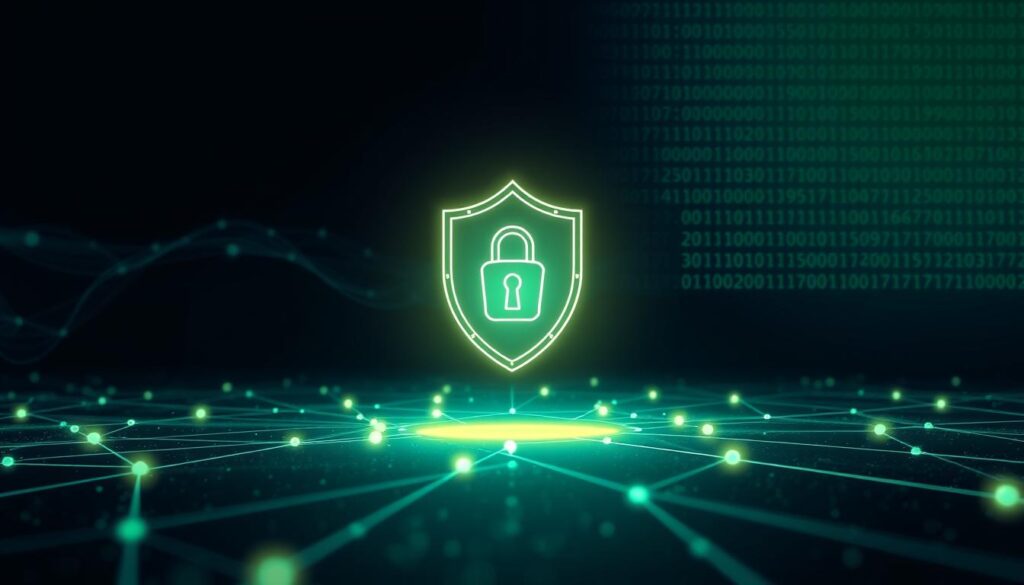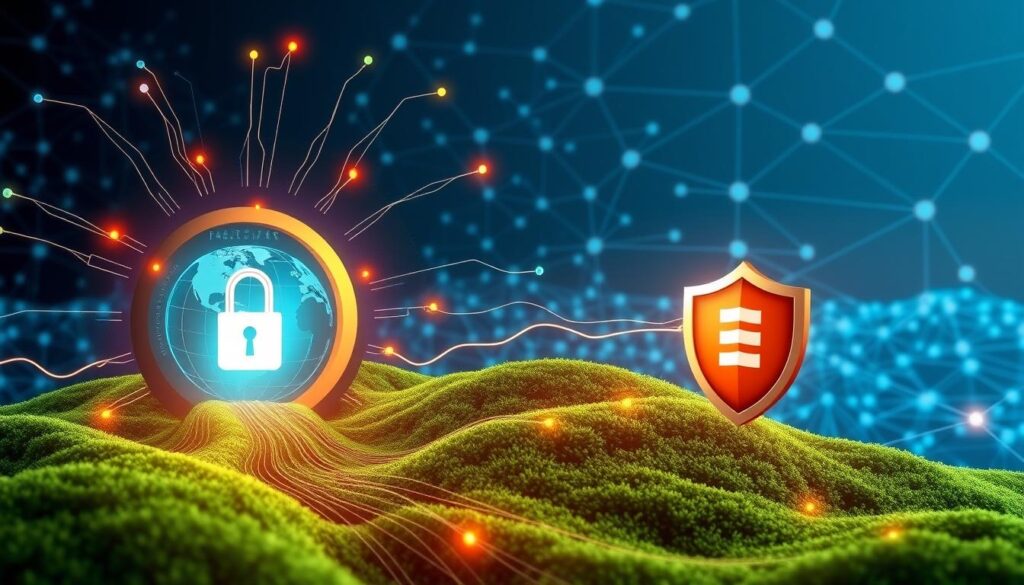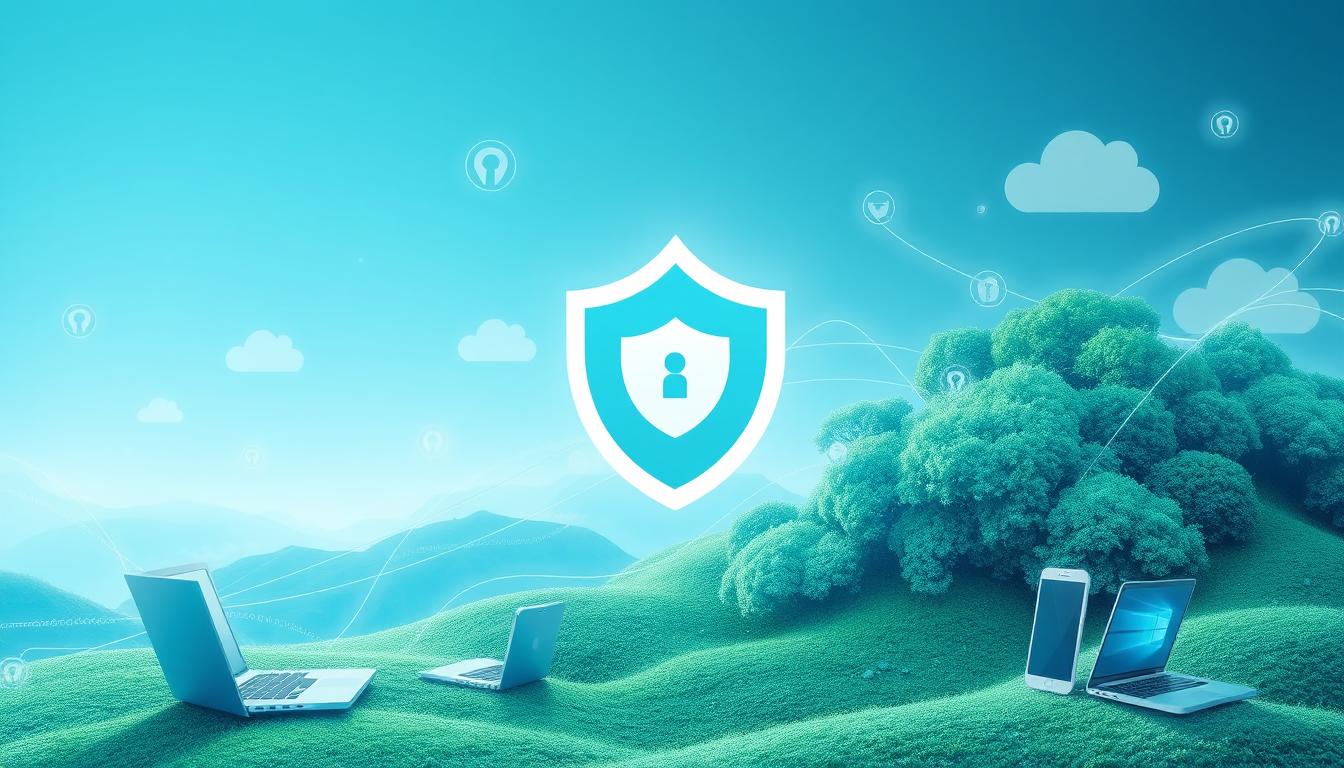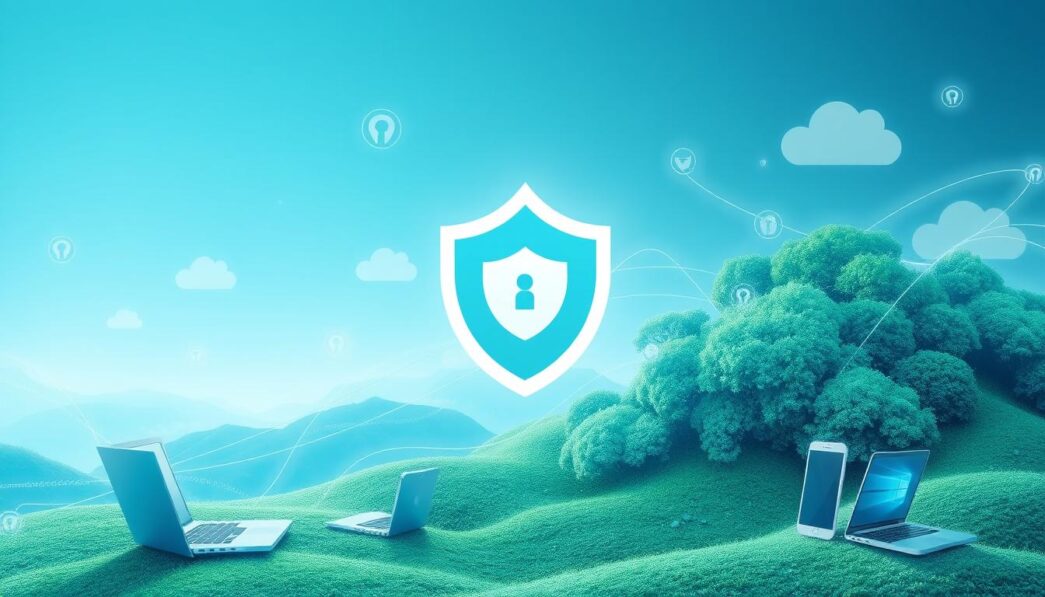Ever wondered how to browse the internet without being tracked? Or how to access content blocked in your area? VPNs are key to secure online privacy and offer many VPN benefits. But how do they work to keep you safe?
A VPN hides your IP address by sending your internet through a private server. This makes your online activities private. It also encrypts your data, so no one can see what you’re doing online.
VPN also lets you access content blocked in your area. It makes it seem like you’re in another country. With strong VPN encryption, your data stays safe, even on public Wi-Fi.
Want to learn more about how VPNs work? Keep reading to understand their security features and why they’re important for your online safety.
What is a VPN?
A Virtual Private Network (VPN) is a key tool for online safety and privacy. It creates a secure link between your device and a remote server. This makes your online activities private and safe from hackers.

Definition of VPN
A VPN, short for Virtual Private Network, hides your internet traffic through a secure server. It changes your IP address and encrypts your data. This keeps your online actions safe from hackers and unwanted viewers.
Historical Background
At first, VPNs were for businesses to safely access their networks from afar. As the internet grew, personal VPNs became popular for individual use. Now, VPNs are key for online security and privacy, especially when using public Wi-Fi or accessing blocked content.
Types of VPNs
There are many types of VPNs for different needs:
- Remote Access VPNs: Great for individuals needing secure remote network access.
- Site-to-Site VPNs: Businesses use these to link their networks securely.
- Mobile VPNs: Designed for mobile devices, ensuring secure connections on the go.
Each virtual private network uses advanced encryption like OpenVPN and IKEv2/IPSec. This ensures strong security. Whether you’re browsing online or accessing work data, picking the right VPN is crucial for safety and performance.
How does a VPN actually work?
A VPN, or Virtual Private Network, uses several key methods to boost internet privacy, bypass censorship and security. It encrypts your data and sends it through a secure server. This makes it hard for ISPs and others to see what you’re doing online.
IP masking is a big part of a VPN’s work. It changes your IP address to one from the VPN server. This helps keep your location private and lets you access content blocked in your area.

VPNs also make sure your data is encrypted. This means only those with the right keys can read it. But, free VPNs might not be as good at this. They can also slow down your internet.
Free VPNs often have ads and track your online activities. They also limit how much data you can use. This can be a problem for those who want fast and private internet.
Most VPNs work well with websites that use HTTPS. But, they can slow down your internet. Choosing a good VPN is important to avoid malware and ensure fast speeds.
VPNs manage many connections through their servers. They use special tables to keep track of IP addresses and ports. This helps your internet connection stay stable. Some people even create their own VPN protocols for extra security.
Encryption: The Core of VPNs
Encryption is the heart of VPN technology. It turns user data into unreadable code, only accessible with a specific key. This security is key for safe internet use, keeping personal info safe.
What is Encryption?
Encryption changes readable data into unreadable code using algorithms. It needs an encryption key for both sender and receiver. AES (Advanced Encryption Standard) is a top choice for strong data protection.
Importance of Encryption in VPNs
VPNs are vital for secure internet use. They encrypt all data, keeping personal info and browsing safe from hackers. They also hide your IP address, allowing for anonymous browsing and access to blocked content.
Types of Encryption Protocols Used by VPNs
VPNs use various encryption protocols for better data protection. AES-256 is a top choice for its high security. Other protocols include:
- PPTP (Point-to-Point Tunneling Protocol): Older but easy to set up, it’s fast.
- L2TP (Layer 2 Tunneling Protocol): Combines with IPsec for better security than PPTP.
- SSTP (Secure Socket Tunneling Protocol): Uses SSL/TLS for strong protection against hackers.
- IKEv2 (Internet Key Exchange version 2): Stable and fast, especially on mobile.
- OpenVPN: Versatile and secure, supports UDP and TCP ports for data safety.
By using these protocols, VPNs create secure tunnels. This stops unauthorized access and keeps user data safe. VPNs are essential for safe online use, offering strong privacy and data protection.
The Process of Tunneling
VPN tunneling creates a secure link between you and the VPN server. It makes sure your online activities are safe and private. This process forms an encrypted tunnel between your device and the VPN server.
First, you choose a VPN service and start an encrypted internet connection. Your data goes through a remote VPN server. There, it’s encrypted to stop others from seeing it. Then, it’s sent to where it needs to go.
This encrypted tunnel adds an extra layer of security. It makes it hard for anyone to get into your data. This is key for staying safe online, especially on public networks.
Protocols like PPTP, L2TP/IPSec, SSTP, and OpenVPN are important in this process. They offer different levels of security and encryption. They also make sure the VPN works well with different devices.
- PPTP: Easy to set up but has weak encryption, which can be risky.
- L2TP/IPSec: Very secure but might slow down your internet a bit.
- SSTP: Uses strong SSL 3.0 encryption but only works on Windows.
- OpenVPN: Offers top-notch security with AES 256-bit encryption, great for those who need extra protection.
These protocols help make sure your browsing is secure. They also make sure your data is well-protected, no matter what device you use.
Businesses also get a lot from VPN tunneling. It lets them create safe connections to their networks from anywhere. This keeps their data safe from hackers and lets remote workers access company resources securely.
Benefits of Using a VPN
Exploring the VPN advantages, users find many improvements in their online life. A key benefit is the privacy and anonymity it offers. This is done by hiding IP addresses and clearing browsing history. It keeps your info safe and lets you access more content.
Privacy and Anonymity
In 2023, 51% of internet users worldwide use VPNs for privacy on public Wi-Fi. This shows how important internet anonymity tools are. Top providers like PureVPN offer strong privacy with tools like Threat Protection. They use top encryption to keep your data safe.
Security and Data Protection
Using a VPN also means better data security. They use strong encryption to keep your data safe from hackers, especially on public networks. They also stop ISPs from slowing down your data. NordVPN, for example, is fast and secure, as shown in AV-TEST’s speed tests.
Access to Geo-blocked Content
A big plus of using a VPN is getting to content blocked in your area. VPNs let you use different IP addresses to access content worldwide. This means you can watch shows and movies from anywhere, without limits.
Common VPN Protocols
VPN protocols are key to how a Virtual Private Network works. They define how data is encrypted and kept safe. We’ll look at the most used VPN protocols, their special features, and when to use them for the best protection.
Point-to-Point Tunnelling Protocol (PPTP)
PPTP is one of the oldest VPN protocols. It’s fast because it uses little encryption. But, it’s not secure because it uses weak encryption. Today, it’s mainly used for old systems where speed is more important than security.
Layer 2 Tunnelling Protocol (L2TP)
L2TP, when paired with IPsec, is a strong choice for secure networking. It combines L2TP’s tunneling with IPsec’s encryption and checks. This makes data safe and private on many devices. It’s popular for its security and works well on modern systems.
OpenVPN
OpenVPN is known for its good balance of security and speed. It uses strong encryption like AES-256 bit and SSL/TLS. OpenVPN is flexible, allowing users to choose TCP or UDP for better performance. It’s a top choice for those who want both security and speed.
Secure Socket Tunnelling Protocol (SSTP)
SSTP is great for Windows users. It uses strong encryption to protect data. It’s good at getting past firewalls and keeping data safe. But, it can be tricky to set up compared to simpler protocols.
Knowing the good and bad of these VPN protocols helps you pick the right one. Whether you need speed, ease of use, or strong encryption, these protocols meet different needs. They’re crucial for keeping your data safe in today’s digital world.
How to Set Up a VPN
Setting up a VPN involves a few key steps. VPNs offer better security than other remote communication methods. It’s important to make smart choices during setup.
Choosing the Right VPN Provider
The first step is picking a good VPN provider. Look for providers with clear privacy policies. A good VPN should offer free trials or limited free subscriptions – but avoid 100% free VPNs like the plague.
Also, choose providers that let you connect multiple devices at once – most support 5-10 devices. They should support apps on app stores and their websites. This ensures you can use your VPN on all devices.
Installing a VPN on Your Device
After picking a VPN, you need to install it. Most VPNs have easy-to-follow guides. You’ll download the client from their website or an app store.
Follow the on-screen instructions. Choose providers with simple login schemes to keep your setup safe.
You can also create your own VPN using a Raspberry Pi.
Configuring VPN Settings
After installing, you need to set up your VPN. Many VPNs come with pre-set profiles for different uses. These can be for streaming, browsing, or privacy.
For custom settings, make sure they match your security needs. Good services will guide you through this. They ensure your VPN works well.
Challenges and Downsides of VPNs
VPNs have many benefits, but they also have some downsides. One major issue is slower internet speeds due to encryption and server distance. This can affect how fast you can connect to the internet.
While VPNs are meant to increase privacy, some providers might log your activities. This raises privacy concerns. Also, the cost of premium VPN services can be a barrier for some users. However, these services often offer advanced features and better security, making them worth the investment.
Reduced Internet Speed
Many users notice slower internet speeds when using a VPN. This is mainly because of the encryption process. It adds extra data processing steps.
The distance between you and the VPN server also plays a role. Activities that need a lot of bandwidth, like streaming and gaming, are often affected. VPNs also use more data for encryption, which can slow things down further.
Possible Logging of Activities
Another big worry is that some VPNs might log your activities. Many claim to have a no-logs policy, but not all stick to it. Free VPNs might even log your data for marketing purposes.
This is a major privacy concern. It’s crucial to check a VPN provider’s privacy policy before signing up. This way, you can ensure your data is safe.
Cost of Premium VPN Services
Premium VPN services can be pricey, ranging from $2.00 to $16.00 a month. For example, PureVPN costs $2.49 a month on a 2-year plan. Surfshark and Private Internet Access are cheaper at $2.29 and $2.03 a month, respectively, for the same period. Avoid using free VPNs – these are riddled with malware, spyware and sometimes viruses.
While these costs might seem high, they often come with advanced features and better security. Some providers even support unlimited devices, which can add value but increase costs.
VPNs can protect you from online threats and let you access blocked content. However, it’s important to consider the downsides like slower speeds, logging concerns, and higher costs. Making an informed choice is key to getting the most out of your VPN.














